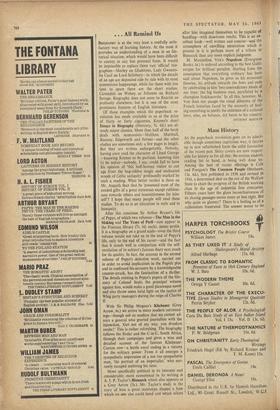Mass History
As the paperback revolution goes on its admir- able though sometimes capricious way, it throws up in new refurbished form the solid favourites of the recent past. Shiny covers are now respect- able for history as for all else; the serious student, reading list in hand, is being well done by Among the best of recent offerings is Cole and Postgatc's The Common People (Methuen. 12s. 6d.), first published in 1938 and revised in 1946, a determined shot on the eve of the Welfare State to chart the progress of the British working class in the age of industrial free enterprise. Fifteen years later the glum inconclusiveness of its closing passages seems more or less right. But why quite so gloomy? There is a feeling as of a millennium frustrated. The answer seems to be
• •
• • • • • • • partly that the authors are continually hoping— and failing, as they would admit—to find, among the intricacies and conflicts of obstructed reform and impotent trade unionism, some development of a basic political and social consciousness among the Common People.
It is a false hope: if the eighteenth century saw the emergence of the mob as a political weapon to be used merely for the ends of its temporary leaders, popular reform in the first two-thirds of the nineteenth century owed its success largely to the lead given by a group of middle-class radicals who were for the first time prepared to make the causes of the lower classes their own, rather than the reverse. If one agrees with the authors that the Chartists were 'pitiable' and 'without dignity,' it should be remembered that Chartism failed largely because working- class agitation was, for a while, abandoned by the middle-class radicals who had worked with it to secure the Bill of 1832.
A truly working-class movement gets under way only later, with the solid establishment of trade unionism; and even then the split between radicals and workers endures, perpet- uated by the inflexibility in politics of a mass trade union movement organised for economic action. Given this, the authors seem to find it .hard to decide whether to measure the progress of the workers by acceptance of Socialist theory in government or by economic advance; they are saddened that the second should not imply the first. lf, as they conclude, the Two Nations still exist, and (as they forecast in 1946) the age of mass consumption is here to stay, their gloom is justified; but these are so not because the reform movement has fallen apart, but because it was never really together. On the increasing caution of the electorate, whatever the reasons, they were more correct than they can ever have feared.
By comparison, Halevy, whose mammoth History of the English People in the 19th Century is now brightly reissued (Benn, 6 vols., 12s. 6d. each), turns the issues upside down. Eisenhower- like, he is depressed by the creeping advance of sombre Socialism; he sees the rightful goals of the working class as economic emancipation without slavish dogma, and political recognition in a framework of free enterprise. The growing strength of trade unionism merely means mutual obstruction between employer and employee. Production is restricted, and with the decline of taissez-faire Britain approaches 1914 with-weary inevitability. In detail, Haldvy's work will long provide an impressive quarry of raw materials; but in general the Victorian era is still near enough for each generation to prefer to write its history again for itself.
Other new paperbacks broadly pepper the his- torical field. Life on the English Manor, by H. S. Bennett (Cambridge, 13s. 6d.) and Powicke's The Reformation in England (Oxford, Ss.) are excel- lently printed and produced. Unillustrated, Burckhardt's Civilisation of the Renaissance in Italy (Muller, 6s.) is less good value than the old Phaidon edition. There are also Prescott's Con- quest of Peru (Muller, 5s.), Machiavelli's The Prince in an adequate new translation (Penguin, 3s. 6d.), his History of Florence in a ponderous old one (Harper, I5s.) and Birnie's rather dull
Economic History of the British Isles (Methuen, 12s. 6d.). Finally, two oddments in the Evergreen series: The Alchemists, by Caron and Hutin, and
The Cathedral Builders, by Jean Gimpel (both 6s.), small and attractively produced and tinged
(especially the first) with that slightly exotic quality that somehow marks the products of the Grove Press.
WILLIAM PLOWDEN















































 Previous page
Previous page